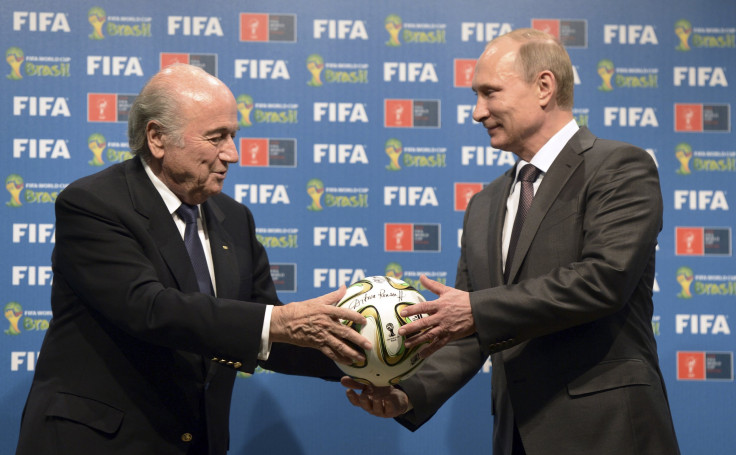World Cup Boycott: FIFA 'Unconditionally Supports' Russia Hosting 2018 World Cup

FIFA “unconditionally supports” Russia hosting the 2018 World Cup, FIFA President Sepp Blatter said to Russia’s R-Sport outlet on Tuesday amid rumors that Western leaders planned to boycott the tournament over Russia’s alleged involvement in eastern Ukraine this year. Russia is ahead of schedule compared with Brazil, which hosted the games earlier this year, according to Blatter.
Blatter spoke directly to the boycott rumors, saying one “will never give any positive effect,” echoing his previous statements of support for both Russia and Qatar’s World Cup hosting awards, which have both caught criticism in political and human rights circles. “We’ve received letters from Europe and North America,” he said. “We answered very politely and carefully by saying ‘OK, we are in football, we are not in politics.’”
The United Kingdom and the European Union have discussed a potential boycott. British Deputy Prime Minister Nick Clegg said it would hit the “one thing” Russian President Vladimir Putin cares about: his status. Germany, which has acted as a valuable middleman in negotiations between Russia, Ukraine and the West, said in early September that it was not yet ready to discuss a boycott.
Blatter is in Russia to help unveil Russia’s official emblem of the 2018 World Cup, which he said “gives not only the heart but it shows also the soul of Russia.” That ceremony will take place at 11:30 p.m. Moscow time, or 3:30 p.m. EDT. “Russia is the world’s biggest country,” he said. “You know, Russia is in the eye of the international media. Football cannot only unite Russia but show the whole world that it is stronger than any protest movement.”
Europe and the United States accuse Russia of invading neighboring Ukraine this year to oppose a post-revolutionary government that seeks to turn toward Europe and away from Russia. A fierce struggle between pro-Russian separatists in eastern Ukraine and the Ukrainian military has left at least 3,600 dead and another 375,000 Ukrainians displaced. Evidence presented by NATO suggests that Russia has progressed from supporting rebels with equipment and supplies to moving in their own heavy weapons to fight Ukrainian forces.
© Copyright IBTimes 2024. All rights reserved.






















